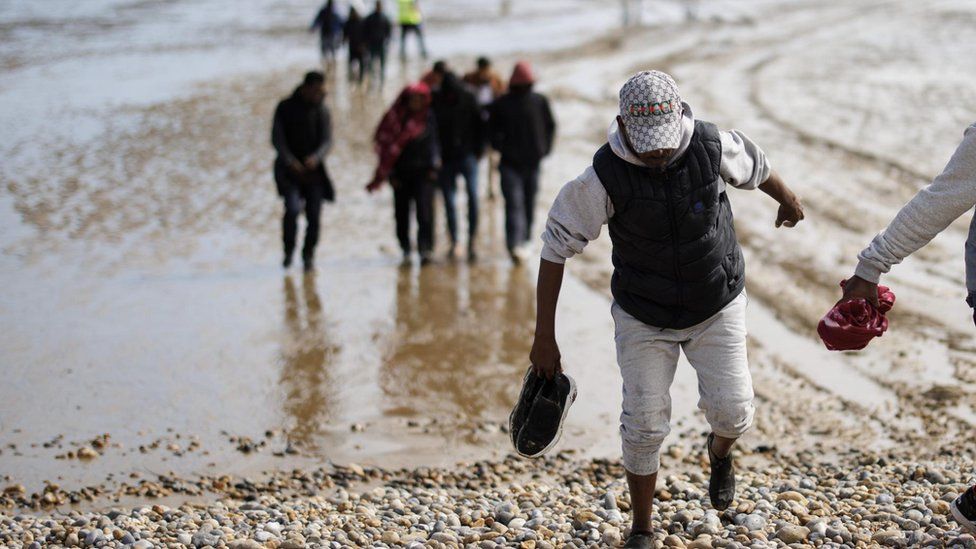
Migrants rescued from a boat crossing the Channel land on Dungeness Beach in Kent last week
The government has not ruled out fitting electronic tags on some asylum seekers crossing the Channel.
Home Secretary Suella Braverman said she was considering “all options” to “exert some control” over migrants arriving in small boats.
The Times originally reported that the Home Office was considering fitting asylum seekers with GPS tags.
It said this was part of efforts to stop migrants who cannot be housed in detention centres from disappearing.
“We will of course need to increase some of our detention capacity,” Ms Braverman told BBC Breakfast when asked about the reports.
She added that the government’s “landmark” Illegal Migration Act – a key part of Prime Minister Rishi Sunak’s efforts to stop small boats crossing the channel – will “empower us to detain and remove illegal migrants more swiftly”.
She said: “We’re considering a range of options – all options – to ensure that we can exert some control over those people who are arriving illegally so that we can thereafter remove them to a safe country like Rwanda.”
The Illegal Migration Act places a legal duty on the government to detain and remove anyone entering the UK through unofficial means, either to Rwanda or another “safe” third country.
However with limited capacity for housing migrants, officials have been tasked with conducting a “deep dive” into ensuring those who cannot be detained do not disappear, the Times reports.
Another option, the paper said, is to require asylum seekers to report regularly to the Home Office in order to get support such as accommodation or financial aid.
The government’s plans to send migrants to Rwanda are currently on hold after the UK Court of Appeal ruled in June that it could not be treated as a safe third country, as there was a risk migrants may be forced back to the country they were fleeing.
The government is challenging that decision in the Supreme Court, and Ms Braverman told BBC Radio 4’s Today programme that parts of the Illegal Migration Act could not be put into action until the Rwanda policy was approved.
“The operationalising of the act is highly connected to our partnership with Rwanda,” she said, adding that the government will “do whatever we can to stop the boats”.
Asked if this meant leaving the European Court of Human Rights (ECHR) – which oversees the rules that led to judges deciding the Rwanda policy was unlawful – Ms Braverman said she thought the Strasbourg-based court was “politicised” and “interventionist” but stopped short of saying the UK should leave.
“No-one’s talking about leaving the ECHR right now. We are working to deliver our plan,” she said.
Meanwhile, figures released by the Home Office last week showed that the number of people in the UK waiting for a decision on their asylum claims has risen to a record high.
More than 175,000 people were waiting for a decision on whether they will be granted refugee status at the end of June 2023 – up 44% from last year.








